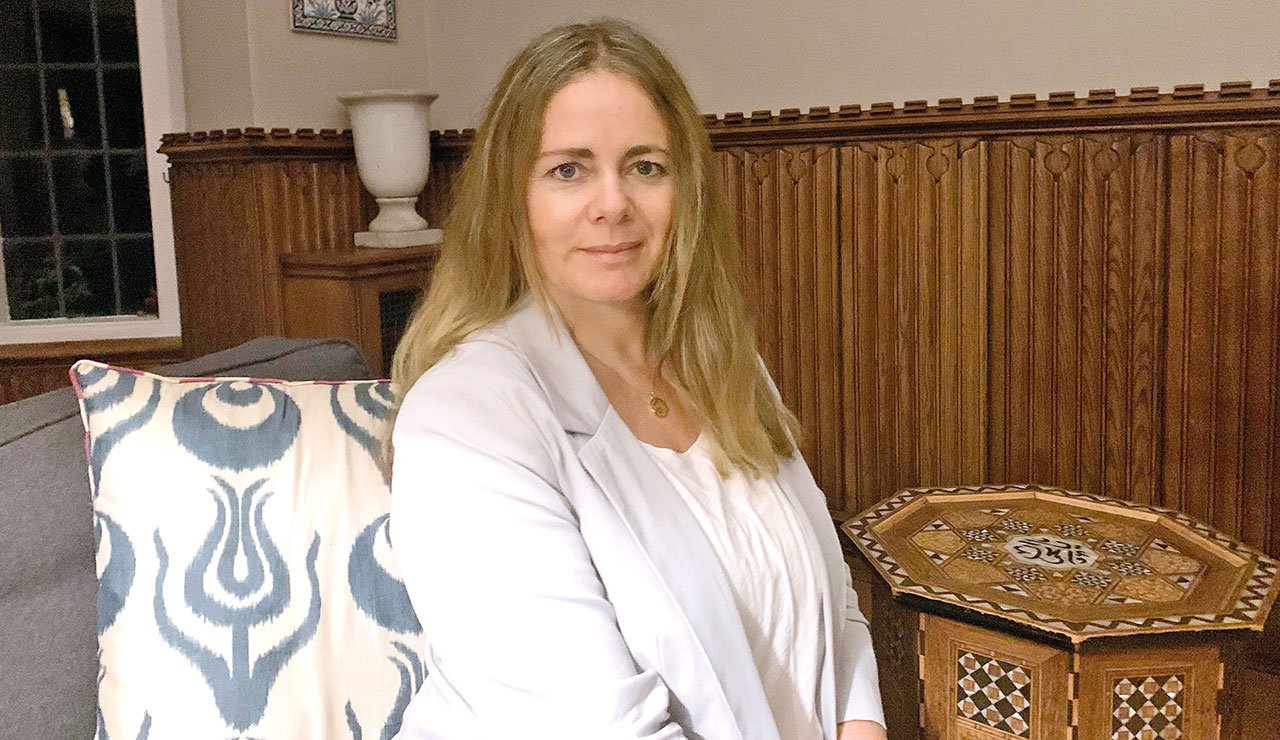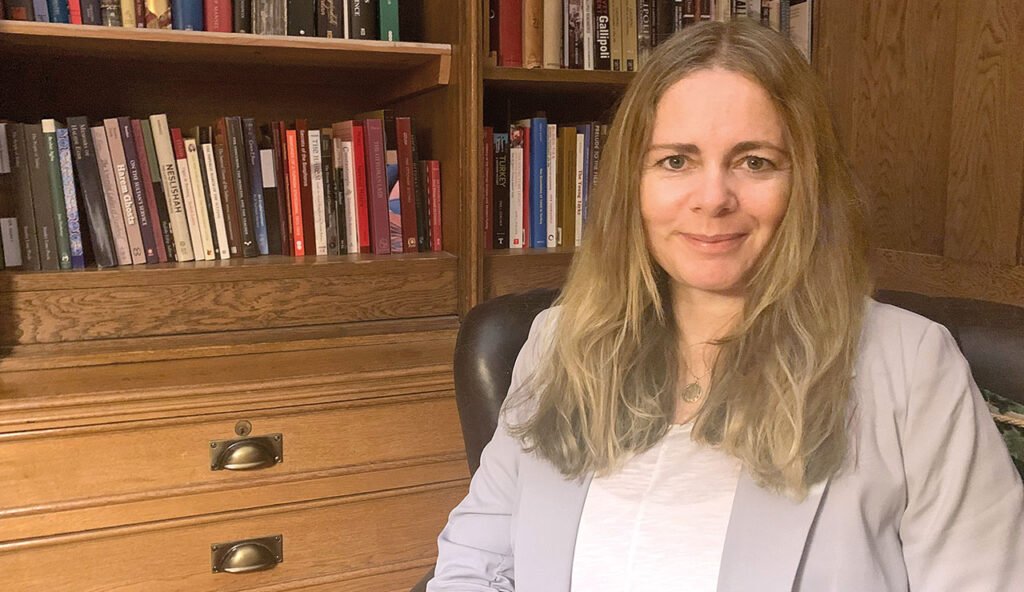Speaking with a descendant of the Ottoman sultans is like opening a window onto a past that, though distant in time, still casts a powerful shadow over the present. The Ottoman dynasty, which ruled for more than six centuries and whose empire stretched from the walls of Vienna to the sands of Arabia, spanning three continents, not only shaped global geopolitics but also transformed the course of world history. Among its most defining moments were the final fall of the Byzantine Empire in 1453, when Constantinople was taken by Mehmed II, and the rise of a power that stood as a formidable rival to Europe’s great monarchies.
Today we speak with Ayşe Gülnev Osmanoğlu, born in 1971 in the United Kingdom into a family marked by exile. Her lineage traces back to Osman I (1299), the founder of the Ottoman Empire, and through him she is a direct descendant of all the sultans.
Following the abolition of the sultanate in 1922 and the caliphate in 1924, the Ottoman imperial family was expelled from Turkey. It was out of this diaspora that Ayşe Gülnev was born. A writer and researcher, she studied History and Politics at the University of Exeter and specialized in Ottoman studies at SOAS in London. Since then, her work has become a bridge between her family’s imperial past and the global present, exploring not only the memory of her ancestors but also the cultural and human legacy of an empire that for centuries served as a crossroads between East and West.
1. Your works have been read both in Turkey and abroad. What differences have you noticed in how they are received and regarded inside Turkey compared to outside?
Because my books are self-published, they are unfortunately not yet easily available in Türkiye, so awareness there is still limited. But what has touched me deeply is how Turkish readers abroad – particularly in the United States, the UK, and Germany – have embraced my work. Many have written to say that my books help them feel closer to their roots, their heritage, and the land of their ancestors. That kind of response is profoundly humbling for me, and shows that stories can bridge distance and generations.
For international readers who are not Turkish, the experience is of course different but equally meaningful. They often approach my books with curiosity, fascinated by the richness of Ottoman history and culture. What surprises me is how often they tell me they discover unexpected similarities with their own heritage, whether in themes of exile, resilience, or cultural transformation.
This, perhaps, is the power of literature: it reminds us that we share the same human emotions – loss and love, belonging and exile, memory and hope. Stories create empathy; they allow us to step into another’s shoes and recognise a shared humanity that transcends geography and time. For me, that dialogue between past and present, and between different cultures, is one of the most rewarding aspects of being a writer.
2. If you had the opportunity to correct one historical error about the Ottoman Empire, which one would you choose?
If I had the opportunity to correct one historical error about the Ottoman Empire, it would be the myth that the last Ottoman Sultan, Sultan Mehmed VI Vahideddin, was a traitor. No member of the Ottoman Dynasty was, or ever could be, a traitor to our homeland. This damaging falsehood was perpetuated in the early days of the Turkish Republic. In truth, during the dark days of the Allied occupation of Istanbul, Sultan Vahideddin formally authorised Mustafa Kemal Pasha’s voyage to Samsun in May 1919, appointing him Inspector of the Ninth Army Corps – a mission that became the first step of the Turkish War of Independence. He also provided substantial financial support to the National Struggle. Far from betraying his nation, he sought to free it from foreign occupation, and only left the country to prevent civil war and protect his family.
In addition, the Dynasty showed true patriotism. Three Imperial princes, Prince Osman Fuad, Prince Abdurrahim Hayri, and Prince Ömer Faruk, fought on the front lines during World War I, from Tripolitania to Mesopotamia, Galicia and even Verdun. Each wanted to join the resistance movement but was prevented from doing so by Mustafa Kemal. Princess Fehime, meanwhile, was active in the underground intelligence network, passing valuable information from the salons of Istanbul to Ankara.
These examples show that the Ottoman family served, sacrificed and remained fiercely patriotic until their exile and beyond. That is the historical error I most wish to correct.
3. Have you ever experienced rejection in Turkey because of the Osmanoğlu surname? Do you believe there are still certain circles that harbor prejudice or hostility toward your family?
Yes, I have experienced rejection and prejudice because of the Osmanoğlu surname. Social media, in particular, can be a hostile platform, and I sometimes receive messages filled with hate – attacks not only on who I am, but on how I look and how my children look, and how we live. It is astonishing that people feel entitled to judge others they have never met, knowing nothing about their lives. They seem to forget that my grandparents were forced into exile aged just 20 and 12, that my father was born in exile, and that I too was born and raised abroad, having to build a life far from my ancestral homeland. Much of the animosity is rooted in ignorance and falsehoods, and at times it can be upsetting, even frightening.
Yet for every hateful message, I receive twice as many filled with respect and admiration – from people who honour my family and our history. Those messages remind me that while prejudice exists, it does not reflect everyone’s opinion. There is also curiosity, empathy and genuine affection, and it is those voices that humble me and stay with me.

4. Among the family stories of exile that have most deeply marked you, are there some you still avoid writing about because they remain too painful, whether on a personal or political level?
Absolutely! My family suffered greatly during their long exile, enduring immense hardship, loss, and indignity – poverty, destitution, and displacement. I would never dishonour their memory by sharing some of the stories I know. They endured their fate with dignity, grace, and resilience, never casting blame or expecting help. Some wounds are too grievous to be exposed.
5. The Osmanoğlu family has a foundation that carries out humanitarian work, particularly in Gaza. Could you tell us more about this philanthropic effort?
The Osmanoğlu Yardımlaşma Derneği (Osmanoğlu Mutual Aid Association), was founded in 2021 by my cousin, Orhan Osmanoğlu. He works tirelessly to bring aid where it is most needed, and has recently concentrated his efforts helping the people of Gaza. He has been working in collaboration with the Egyptian Red Crescent there, bringing aid through Port Said – delivering food parcels, clean wáter, baby formula, medical supplies and providing daily hot meals through the Hamidiye Community Kitchen which is a branch of the foundation. The foundation has also provided aid in Hatay province since the earthquake disaster in 2023, supported an orphanage in Idlib in Syria, and built and repaired wells and set up women’s training initiatives in parts of Africa.
You can follow their efforts on Instagram @osmanogluyardimlasmader and donations can be made in the following ways:
- TL (TRY) IBAN: TR92 0020 3000 0883 8159 0000 01
- EUR IBAN: TR38 0020 3000 0883 8159 0000 03
- USD IBAN: TR65 0020 3000 0883 8159 0000 02
- GBP IBAN: TR81 0020 3000 0883 8159 0000 05
- BIC/SWIFT: BTFHTRIS
- Bank Account name: Osmanoğlu Yardımlaşma Derneği (Albaraka Türk, İstanbul Fatih branch)
- WhatsApp (donor line): +90 549 114 1453
6. Do you think President Erdoğan sees himself as a kind of modern-day sultan?
I do not comment on contemporary politics.
7. Do you believe that today an Osmanoğlu could become president of Turkey without provoking resistance?
No! Such a thing is unthinkable. It would never happen, nor do I believe it should. My family is not political, and I believe we must always maintain a non partisan stance. Our focus is on preserving history, honouring our heritage, and contributing to society through cultural, educational, and humanitarian work.
8. Beyond your family name, what personal legacy would you like to leave?
Of course, my most enduring legacy will be my five children. They are the light of my life, my raison d’être, and through them the blood of the House of Osman will continue to flow…
Beyond them, I hope to leave a legacy through my writing. My novels, The Gilded Cage on the Bosphorus and A Farewell to Imperial İstanbul, were written to give voice to my ancestors, so that their stories might finally be told, and their memory preserved for their descendants. I have just completed the third book in the series and am currently working on the edits, with hopes to continue writing and sharing more stories in the future.
9. What advice or lessons passed down from your ancestors do you believe still hold value today and could inspire not only Turks but humanity at large?
The foundation of the Ottoman Empire – at its best – was a belief in justice, charity, and religious toleration. We were a multi-faith, multi-ethnic, pluralist empire. We were not always perfect, but at our core we respected diversity and believed in a harmony of difference. Today, in our fractured world, such principles are urgently needed, and the Ottoman example of fostering peaceful coexistence among communities of different faiths and cultures for centuries offers a powerful lesson. Palestine, for instance, experienced over 400 years of peace under Ottoman rule – a testament to what is possible when diversity is embraced and defended, and a stark contrast to the ongoing tragedy and horrific suffering inflicted upon it today.
That same belief is what I admire most in literature, and what I hope, in a small way, my own books express: a plea for empathy, for understanding, for compassion, and for peace. These are values that transcend time and place, and could inspire not only Turks, but all of humanity.

IMPORTANT
This content is the exclusive property of Newsyman © and is protected by copyright laws. If you wish to reproduce it, please be sure to mention our media, the author and include a link to this page.





